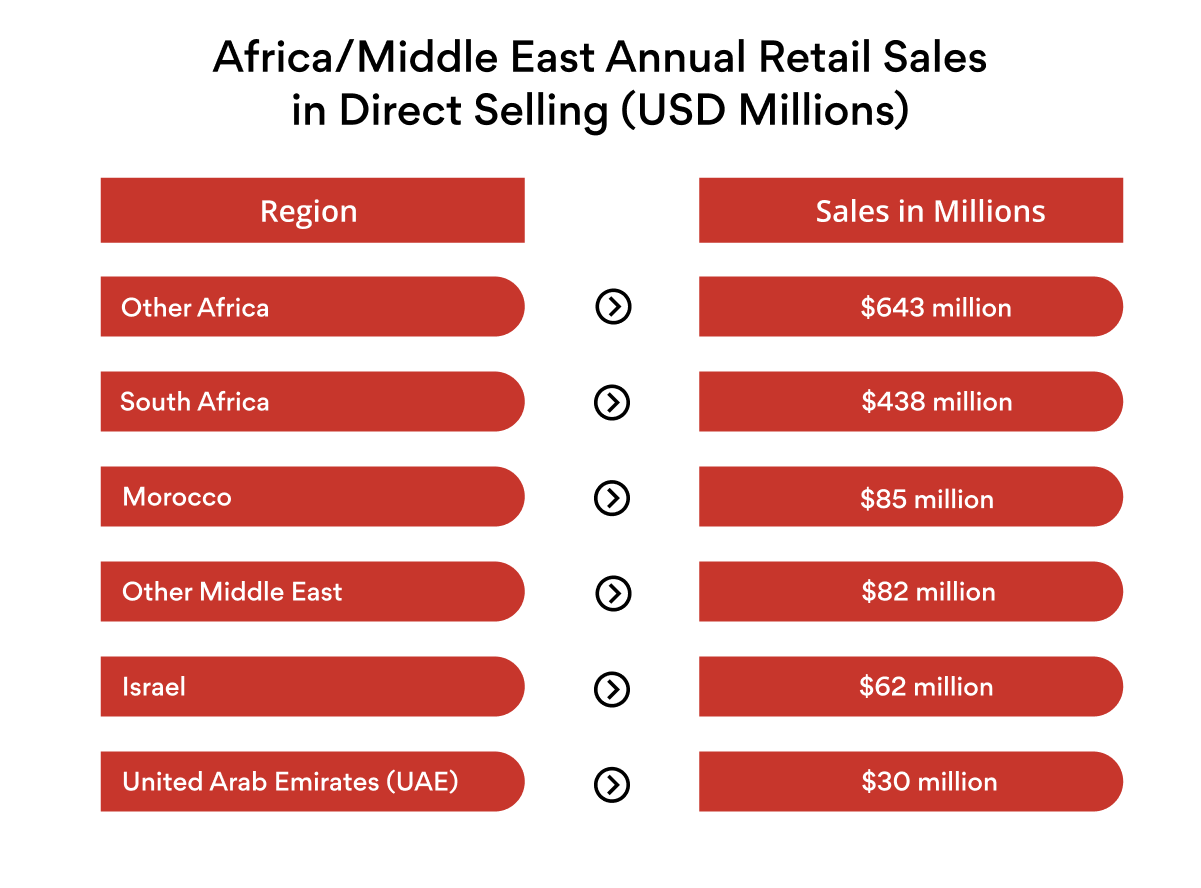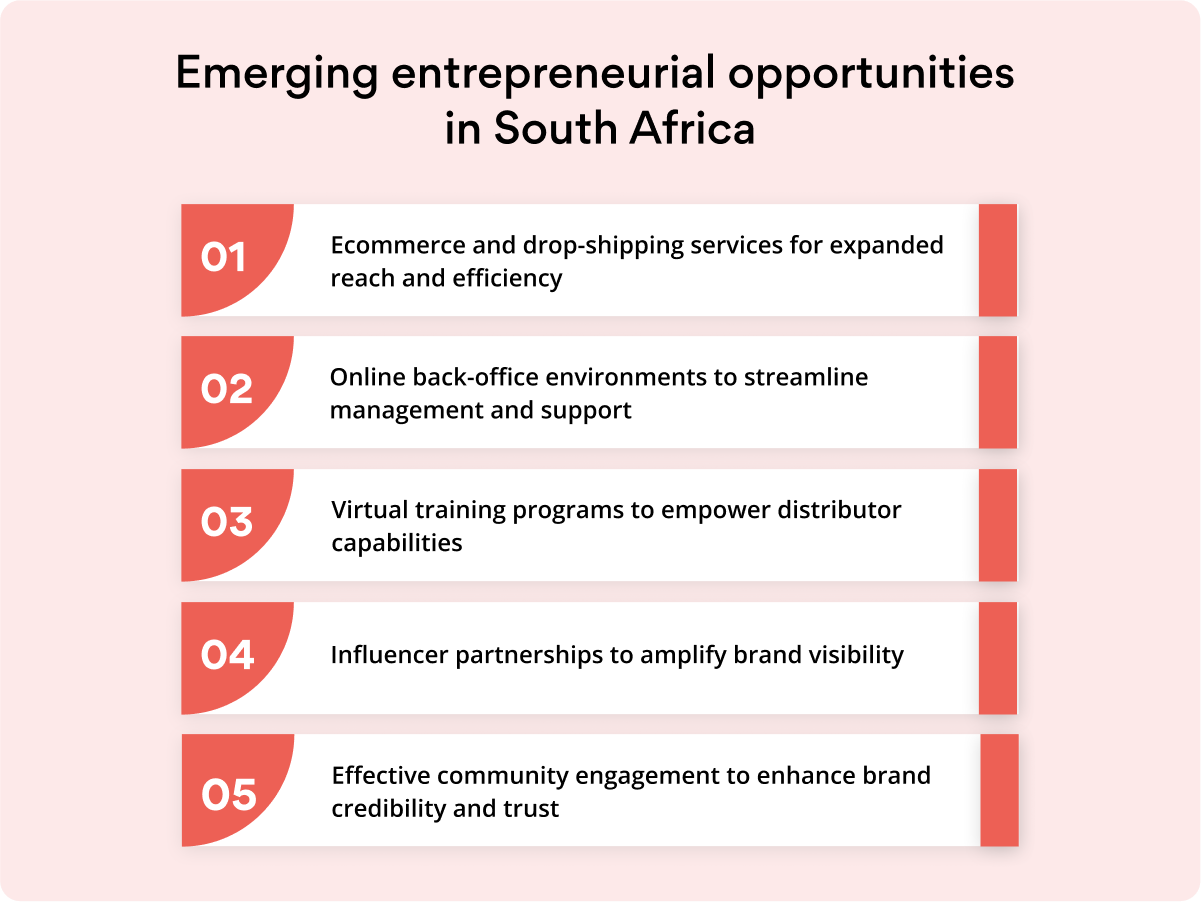Known for their youthful, large number of middle-class population and growing emphasis on digital transformation and sustainability, Africa and the Middle East are two high-potential business zones where businesses are thriving. For the kind of diverse markets, unique challenges, and opportunities that these regions behold, direct selling and MLM businesses in Africa and the Middle Eastern markets are evolving in the competitive business landscape.
The direct sales scenario in Africa and the Middle East

Owing to various socio-cultural, economic, and strategic situations, the African and Middle Eastern regions faced a significant decline in their retail sales of 22.5% between 2019 and 2024. Although there was a 4.4% increase to $1,805 million in 2020 portraying a strong resilience during the early pandemic period, it fell by 11% in 2021 to $1,607 million, 13% in 2022 to $1,395 million, and 4% in 2023. More precisely, retail sales in Africa decreased by 21% and in the Middle East by 29% between the period of 2019 to 2023.
The network marketing businesses in these regions have faced serious encounters that led to the decline of direct selling businesses over five years. The Middle Eastern region saw a severe decline as compared to Africa which underlines how the region needs to be approached henceforth from the direct selling point of view. Considering the amount of competition in all areas of business, the Middle Eastern market needs a thorough analysis to understand what is stopping it from creating a strong ally between the direct selling industry and the Middle Eastern markets. The underlying cause behind the decline needs to be carefully learned and implemented clear strategies to win over the market and achieve sustainable growth in the years to come.
Epixel MLM Software is making a proactive and insightful attempt to identify the market dynamics of MLM businesses in the African and Middle Eastern regions, ongoing challenges, strategies for success, and key areas to focus on to build a successful and sustainable business network.
Region-specific insights
South Africa
According to the WFDSA (World Federation of Direct Selling Associations), the 2023 retail sales in the South African region saw a 13.2% decline to $ 438 million. The reason for the fall, although the trend has been recurring since 2020, is mainly an uncertain political situation that hampers smooth business operations and diminishes customer confidence in venturing into MLM or direct selling businesses. A clear case of how political instabilities are also a reason for reverse business growth and decline.
Other reasons that led to a decline in retail sales in the direct selling industry in the past year are
- Lesser or no access to basic human necessities such as electricity and water
- Increasing crime rates led to unsafe living circumstances that prevented customers from spending, or making business investments
- With the expansion of ecommerce channels, customers deflected from conventional direct selling business models
- The rising number of cryptocurrency scams abated customer trust in financial transactions and indirect selling channels.
These factors impacted the direct selling industry heavily compared to other retail businesses. Statistics show that while direct selling businesses fell by 13.2%, conventional brick-and-mortar retail fell by only 1%, and ecommerce made a 29% surge in 2023.
However, the region’s growing interest and demand for wellness and personal care products is an exciting and promising opportunity for the direct selling companies to tap into. Online or going digital is expanding the possibilities of direct selling businesses by increasing their brand presence. South African markets being open to Asian brands is an ideal window to seep into the market with innovative MLM products and business practices.
In the years to come, according to expert prediction, direct selling in the year 2024 will remain flat in South Africa not undergoing any significant changes. However, focusing on youngsters who want to venture into entrepreneurship could take up direct selling as an opportunity to be their bosses and build a new business. Also, making use of attractive strategies with product presentation, digital presence, and influencer collaborations could bring in young and dynamic customers and distributors into the direct selling business.
Morocco
One of the prime North African regions Morocco saw its direct selling retail sales fall 4.5% to $ 276 million. While the rest of the scenarios remain the same as that of the South African region, the region has a higher potential to scale growth and contribute towards global direct sales if these key strategies are carefully integrated into the framework.
- Embracing sustainable business products and developing products and services that are in line with the values and ethics of the end customers
- Devise targeted marketing campaigns to enhance customer engagement, strengthen customer relationships, and fuel loyalty
- Provide opportunities for the female sales force to enter the market and perform through curated programs and resources.
Other African countries
The direct selling business in other African countries also saw a steep decline in their retail sales by 17.5% to $ 256 million. As a steppingstone to improving the scope and success of direct selling business in other African countries, expert direct selling businessmen suggest strengthening their digital presence to stay at par with rising competition in the ecommerce sector. It is also important to diversify product offerings by launching a wider array of products to cater to varied customer demands and needs

Middle Eastern countries
According to the WFDSA 2023 report, direct selling retail sales in the Middle East fell by 2.3% to $ 171 million, Saudi Arabia by 5.8% to $ 130 million, and UAE (United Arab Emirates) by 10.4% to $ 51 million. Similar to the African scenario, the Middle East is a very sensitive market that is spoiled for choices. Hence, abiding by strategic recommendations suggested by industry experts could help the direct selling industry win over challenges and attain sustainable growth.
The Middle Eastern region being specific about their preferences and choices, MLM brands should concentrate more on curating products and devising marketing strategies that are in consonance with the regional and cultural preferences of the population. MLM businesses should exercise measures to combat fraudulence and forgery and thus build customer trust through transparent business practices and reliable product offerings. Embrace the customer-first business strategy and enhance community support. Build a sense of community among distributors as well through online and offline events and mentorship programs to let them know that they are valued.
Key business foresight
Vastly comparing, the African region has experienced a 21% fall in retail sales and the Middle Eastern region faced a 29% decrease. These impacts were derived due to numerous factors that have a direct or indirect influence on the growth and success of the direct selling business.
As discussed before, one of the major external factors that led to the constant decline in business is the political and economic instability that has hampered customer confidence and smoother business flow. While globally the direct selling industry is scaling across digital channels, the African and Middle Eastern MLM markets not keeping up with the rising ecommerce platforms is yet another reason for the steep fall. Direct selling and MLM businesses in African and Middle Eastern countries necessarily need to make a strategic shift to digital platforms to rise above challenges and win consistently.
Taking the gender dynamics and youth engagement factors into consideration, direct selling business has provided numerous livelihood opportunities for women in South Africa and Colombia. There are over 89% and 81% women distributors in both these countries respectively highlighting how focusing on empowering women is crucial for direct selling businesses to encourage more women to venture into the business and make this a sustainable source of income for a larger population. So is the younger generation who aspires to be entrepreneurs chooses direct selling as a unique opportunity to earn a parallel or sole income for the numerous growth possibilities and operational flexibilities.
In the competitive business landscape keeping up with competitors breaking conventional direct selling norms and integrating drop-shipping services, comprehensive online back-office environments, etc are sure to increase the possibilities of business growth. Innovations in terms of product development, business strategies, and marketing are inevitable to adapt to the rapidly changing business direct selling domain.
Considering how customers irrespective of gender, age group or demographics are inclined to health and wellness products there is a rising demand for personal care and wellness MLM products. This is an ideal opportunity for health and wellness MLM businesses to tap into and expand their growth possibilities.
Discover how we build resilient businesses with advanced MLM functionalities
Strategic business implications for Africa and the Middle East Direct Selling Industry
In order to build a future-oriented direct selling brand in the fast-growing business landscape, having a robust MLM ecommerce platform is nothing short of essential. Leveraging MLM digital marketing and online platforms to reach a larger audience and neutralizing the decline in conventional sales is the next thing to do for MLM businesses to tame a tough market and yield growth. In an era where everybody is a social media influencer, leverage the possibilities of influencer collaborations to enhance social media engagement, run targeted online campaigns and captivate the younger demographics into the business.
While focusing on the younger demographics, it is also important to make sure that product innovation and sustainability are taken into account to sync product offerings with recent customer interests. From raw materials involved in product development to product packaging and shipping, considering sustainability would be yet another important milestone in business growth and expansion.
As much as a brand focuses on improving its sales and business by enhancing customer engagement, be sure to strengthen salesforce engagement by empowering distributors through comprehensive training programs. Enable distributor capabilities through advanced digital selling skills and upgrading their strategic knowledge from time to time. Keeping distributors active and engaged through efficient incentive programs is an effective way to keep the distributor force motivated to perform better each time.
As a growth-focused business, while venturing into or operating in the African and Middle Eastern countries, be sure to keep your focus tight on growing countries such and Columbia, Peru, and Argentina in the region for the strong growth potential that this region beholds. Replicate success strategies from highly successful and growing markets into African and Middle Eastern markets to run growth trials and drive success.
Conclusion
While the direct selling industry as a whole saw a global decline in retail sales, the African and Middle Eastern markets has quite a few grappling challenges to overcome to build a fertile business ecosystem. Identifying the underlying cause behind the challenges and learning how to overcome adversities are the key points to focus on to actively rejuvenate the industry. Making a paradigm shift with digital transformation, product innovation, and targeted engagement empowering women and enticing the younger generation is the ideal way forward for direct selling businesses to build their own forte.
Beyond these, the African and Middle Eastern regions have greater potential if MLM businesses can rework on their strategic focus and sharpen their attention towards digital integration, product alignment, salesforce empowerment, building brand credibility, fostering community, and investing in targeted markets.
Focusing on these key areas is crucial for direct selling businesses operating in the region to navigate through challenges and capitalize on emerging opportunities. Working towards stabilizing and enhancing the market presence of MLM companies with inventive business strategies and innovative products could take the brand to new zones of growth and success.









Leave your comment
Fill up and remark your valuable comment.